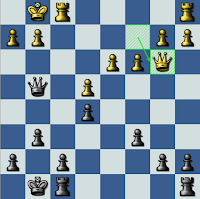Blitz Rating: 1500
Standard Rating: 1758.3
Theory Rating: 1534.3
Practice Rating: 1500
I've been doing chesstempo everyday for about 30 minutes or so and my standard rating is slowly rising. But more importantly, it seems that I've getting back my feel for tactics.
Although this so called "feel" is hard to explain. Is it intuition? I dunno.. Its just that my brain "suggests" moves when I encounter certain positions.
I seem to notice too that the pieces seems to have their own favorite moves.
For example, the queen seems to like moving in a triangular fashion. That is to say, it would first move along a rank then along a diagonal to deliver a fatal blow somewhere. Sometimes it makes the sign of Zorro.. (The 'Z' pattern)
The rooks remind me of crabs.. it almost invariably wishes to go sideways..
The knight seems like a wheel turning round and round in circles..
The bishops are daggers.. but it is one way. It moves to an extreme edge of a diagonal never to come back..
The hardest thing to see are pawn moves. They are the silent ones. Moving with great difficulty but with terrible force once they do.
Well, anyway.. yeah, I've been solving too many puzzles lately..
Although this so called "feel" is hard to explain. Is it intuition? I dunno.. Its just that my brain "suggests" moves when I encounter certain positions.
I seem to notice too that the pieces seems to have their own favorite moves.
For example, the queen seems to like moving in a triangular fashion. That is to say, it would first move along a rank then along a diagonal to deliver a fatal blow somewhere. Sometimes it makes the sign of Zorro.. (The 'Z' pattern)
The rooks remind me of crabs.. it almost invariably wishes to go sideways..
The knight seems like a wheel turning round and round in circles..
The bishops are daggers.. but it is one way. It moves to an extreme edge of a diagonal never to come back..
The hardest thing to see are pawn moves. They are the silent ones. Moving with great difficulty but with terrible force once they do.
Well, anyway.. yeah, I've been solving too many puzzles lately..




